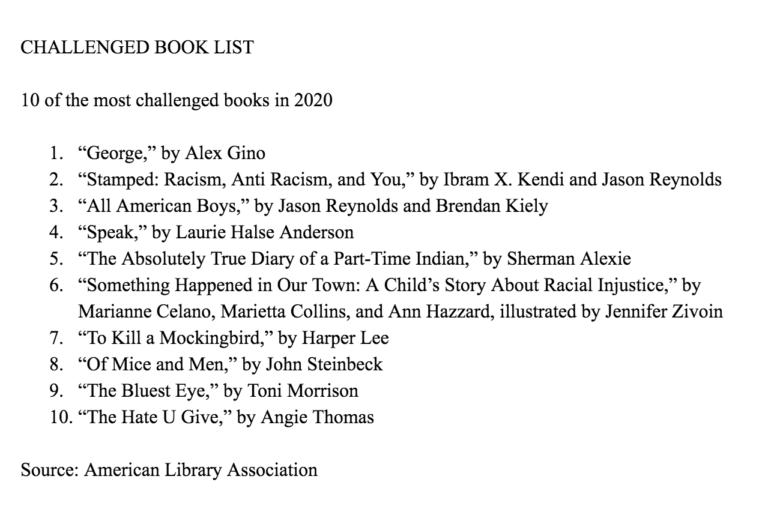By JADA PENN
Capital News Service
LANSING — Michigan has seen an increase in public library and school library books challenged by parents and patrons, especially titles related to the LGBTQ+ community, according to library officials.
The American Library Association says the critics argue that their intent is to protect children from exposure to explicit content and inappropriate language.
“George,” a LGBTQ+ novel by Alex Gino, is frequently the most-challenged book, according to the association. It’s a children’s novel about a young, transgender girl.
The American Library Association reported 156 book challenges in 2020, but officials have said the number for 2021 could be double or triple that. The 2021 report is expected to be completed in April.
Deborah Mikula, the executive director of the Michigan Library Association, said the state’s 396 public library systems create and follow their own policies in consultation with their attorneys.
Most libraries have policies in place for handling such challenges, Mikula said.
“We all have a right to go to our library that is tax-supported, and if we pick up something or children bring something home that they find offensive, they can challenge that book,” she said.
Mikula said the increase in challenges stems from political reasons and that efforts to improve diversity are not accepted in all households.
“If I don’t believe in diversity based on gender, where do I go first?” Mikula said, referring to some parents “who are upset by the presence of certain books in their libraries.”
If a complaint concerns school libraries, which have experienced the largest increase in complaints, “you would go to your school board,” she said.
Reasons for challenges includecontent with sexual abuse, conflict with religious viewpoints, profanity, drug use, alcoholism, “divisive language,” racial slurs, racist stereotypes and “anti-police messages,” according to the national association.
The state association is seeing conservative viewpoints that are well-funded through organizations that are political in nature and that assert conservative family values, according to Mikula.
The 2021 Traverse Area District Library’s Pride Week display in the children’s department spurred complaints, according to youth coordinator Andy Schuck.
“Over the course of two weeks, we had five different calls from community members about the display,” Schuck said. “They didn’t think it was appropriate for the kid’s department, but we kept the display.”
Despite last year’s grumblings, the library plans to have another LGBTQ+-related display in June, he said, adding, “I’m sure we will hear more complaints this year.”
Michigan is far from the only state with book challenge woes. Last month, for example, a Virginia legislative committee killed a proposal requiring parental consent before their children could check out sexually explicit books at school libraries.
Also last month, a Tennessee school board banned “Maus,” the Pulitzer Prize-winning graphic novel about the Holocaust, from its eighth-grade curriculum.

Thomas Morgan, a communications consultant for the Michigan Education Association, said students need to hear all viewpoints and have a broad-based education to fully prepare for college and the workplace. The MEA is the state’s largest union of teachers and other school personnel.
“As an organization, we strongly support the First Amendment, and we believe that having a diverse education with a wide variety of sources is the best course for Michigan students. We strongly oppose politicians trying to ban books – that’s wholly un-American,” Morgan said.
Thais Rousseau, the collection development director at Capital Area District Library in Lansing, said she is seeing informal complaints from parents.
“Oftentimes it’s about items that they see on the news or that they’ve heard things about,” Rousseau said.
“They’re asking questions about their appropriateness for that part of the collection, and we explain that the library has items for everyone in our communities,” she said. If a family isn’t interested in those items, “we have plenty of other titles that we can help them find.”